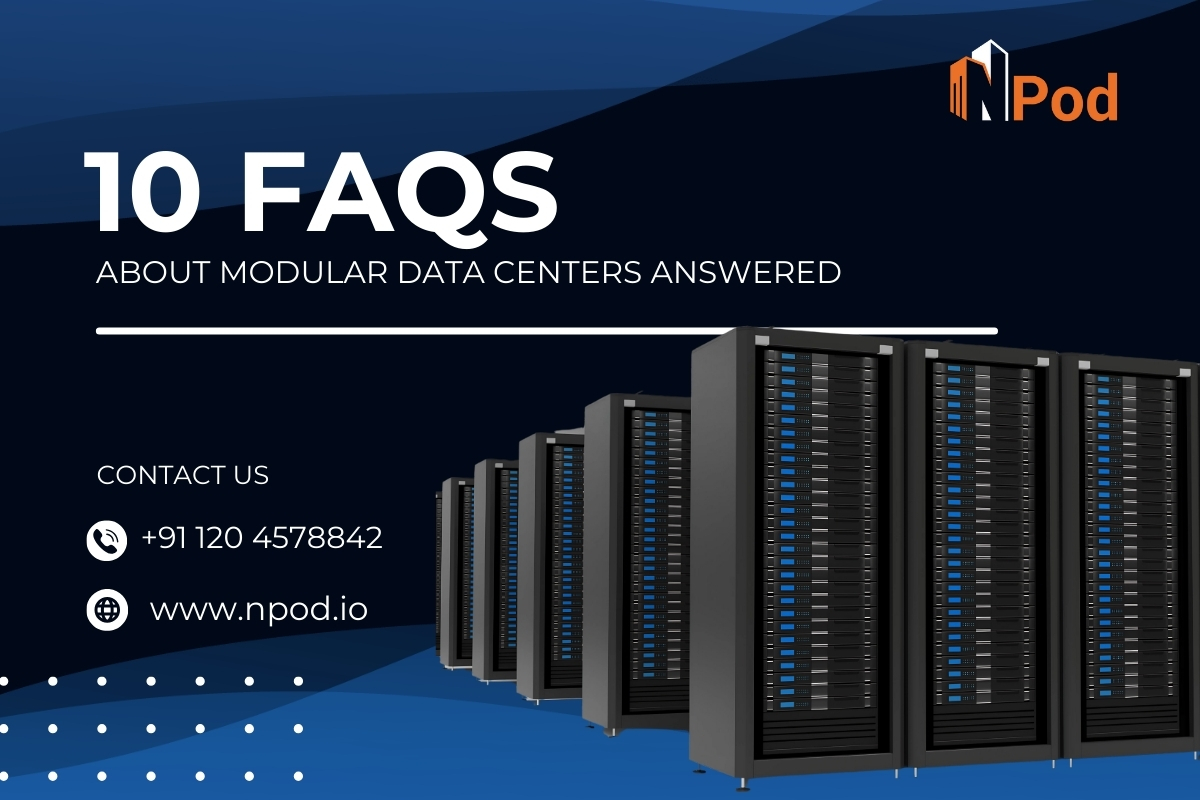Modular data center systems are changing the way businesses are managing their data center / IT infrastructure. Modular data centers allow for increased flexibility, scale and efficiency when compared to a traditional data center. In this blog, we’ll discuss the 10 most common questions about modular data centers to help you discover why they are becoming the preferred building block for IT infrastructure.
1. What is a Modular Data Center?
A modular data center is a pre-fabricated, self-contained, unit or pod which combines servers, storage, network gear and cooling, all in to one solution. These technologies based structures can be built quickly, and scaled to support the needs of the business, when compared to a traditional data center. Modular data centers are designed for fast deployment, energy efficiency and ultimately reduced operating cost.
2. How are Modular data centers different than a traditional data center?
Traditional data centers require a significant amount of construction time and have time lag for delivery, and they can take month or even years to get from the start of construction until it is operational. Modular data centers are typically built-in module/pod units, which are factory manufactured and can be put together on site in a couple of weeks to a month. Modular data centers can be good options for companies that have the same criteria of deployment time and scalability.
3. What Are the Benefits of Modular Data Centers?
There are a variety of benefits to modular data centers:
• Scalability: Simply add modules as needed to satisfy your data needs.
• Cost Benefit: Less capital investment upfront than a standard building.
• Flexibility: Deployable across a variety of sites, including city or remote locations.
• Energy Efficiency: Cooler systems and power systems to reduce operational cost.
• Fast Deployment: Up and running in several weeks’ vs several months.
4. Who Stands to Benefit from Modular Data Centers?
Any size company can benefit from modular data centers. Some examples of who will benefit are:
• Enterprise looking to scale quickly
• Remote offices requiring on-premises IT infrastructure
• Cloud service providers
• Companies taking a focus on disaster recovery, continuity of business
• Edge computing use cases related to IoT, AI and smart cities.
5. How Secure Are Modular Data Centers?
Security is amongst the highest of priorities regarding modular data centers. Modular data centers have all have physical security measures in place like biometric access control, CCTV and fire suppression to secure the equipment. Modular data centers can be designed to comply with regulations by achieving industry compliance standards, to keep sensitive data secure.
6. What are the costs of modular data centers?
Costs with modular data centers will differ based on factors such as capacity or customizations made for a unit, as well as the location of the facility. Micro data centers have a much lower cost of entry than a typical data center, and the overall costs depend on the following parameters:
• Number of modules
• Power and cooling
• Network infrastructure
• Integration with existing IT
Spending capital on modular data centers can save overall costs in the long run, as due to less time to build, energy efficiency, and the ease of growth.
7. Are modular data centers deployable anywhere?
Yes. One of the greatest properties of modular data centers is their deployability. They can be deployed onsite, at the edge or in the field. Prefabricated units can be shipped to the deployment site, to assemble with little to no build or disruption.
8. How long does it take to deploy a modular data center?
Deployment time is significantly shorter in comparison to traditional deployment periods. Depending on the size and complexity of the modular data center, it could take as soon as a few weeks for the disorder of modular data center, instead of a few months for a typical build. Quick deployment time.
9. Will Modular Data Centers Be Energy Efficient in the Future?
Absolutely. Modular Data Centers are certified to be energy efficient and make use of sufficient advances in cooling and power modules that are specifically engineered to extract the full value out of energy efficiency. Together, this lowers energy consumption, decreases operating costs and creates an environmentally responsible business.
10. What Will Be the Future of Modular Data Centers?
The modular data center market will continue to grow, cloud computing will continue to develop and therefore AI and edge technology will develop, so organizations will need flexible, scalable, cost effective infrastructure and Modular Data Centers meet that need and creates a new normal for sustainable, reliable, secure and efficient data center for modern enterprises.
Conclusion:
Ultimately Modular Data Centers are not a fad or a trend, Modular Data Centers are necessary for organizations looking for performance, efficiencies and cost containment. Understanding why we want to ask Email FAQ’s gives you the framework to really consider a Modular Data Center model in your future infrastructure needs.
